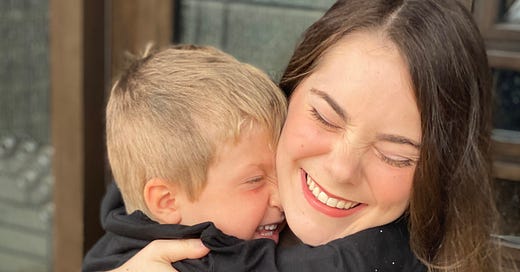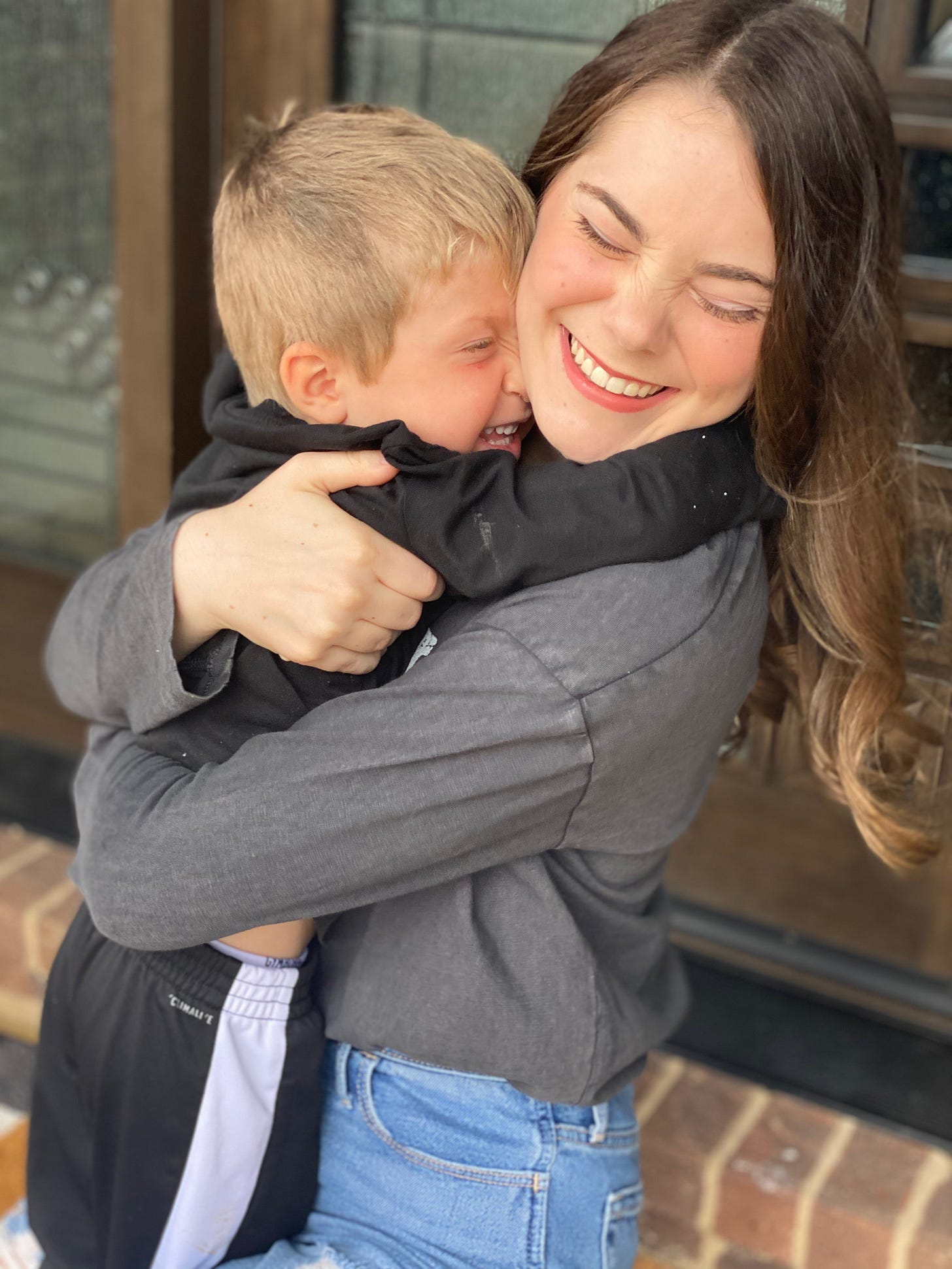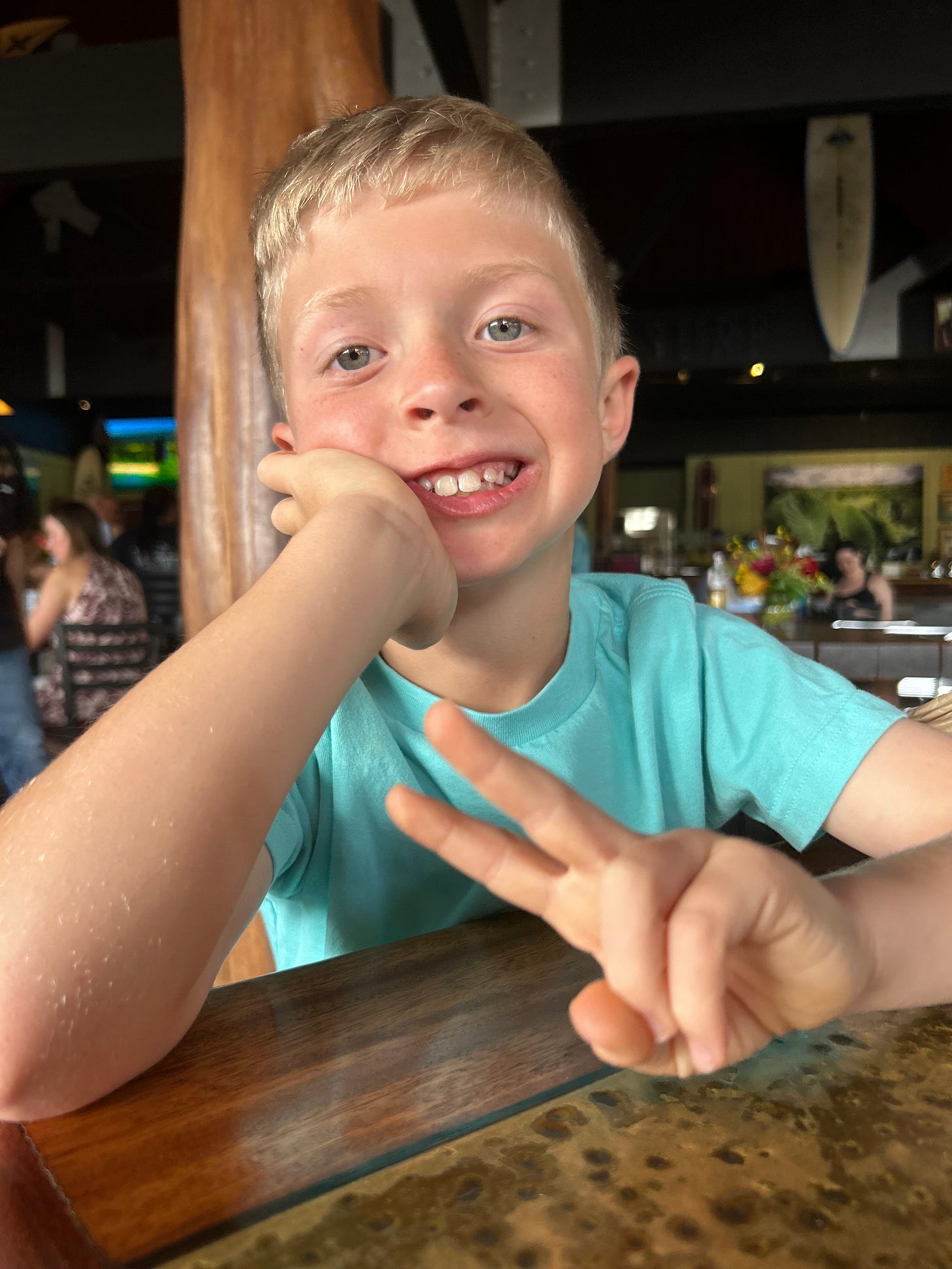What my brother's dyslexia has taught me about writing 💛
On the impact of audiobooks and why non-dyslexics shouldn't take literacy for granted
I have the best little brother in the world. I know most people with a younger sibling would protest that claim, but they don’t know Noah! Noah is spunky, energetic, and loving. What’s especially incredible about him, though, is his resilience. At only eight years old (almost nine, he would point out here), he has already been through - and conquered - more than most adults.
Much of what Noah has experienced is a bit too personal for my newsletter, so you’ll just have to take my word for it. Today, though, I’d like to tell you a little bit about Noah’s dyslexia and how he has shaped me into the writer I am today.
Since no one else in our family has dyslexia, Noah’s diagnosis required a lot of learning and understanding on our part. For one, I always assumed that a person with dyslexia actually sees jumbled letters when they look at words (a special thanks to the Percy Jackson movies for giving me this interpretation 😂). Evidently, that’s not quite right - it’s not the visual connection that’s off for dyslexics, but the decoding of the symbols to understand the correct meanings of words and sentences.
P.S. If you have dyslexia (or study it) and can explain this in a better way, please do so in the comments! I am no expert on dyslexia and don’t pretend to understand what it’s really like.
Another thing that I found interesting about Noah’s diagnosis was that it didn’t imply he disliked books or reading in general. In fact, my little brother loves books. We’ve been reading to him since he was a baby, and he now spends hours poring over picture books and listening to audiobooks. I’ll often find him hunched over a Guinness World Records book in his bedroom, his eyes trained on the images in an attempt to discern the page’s meaning. Hardly a day goes by that I don’t hear his ‘Alexa’ reading to him.
When Noah reached the age where he started learning to read and write in school, though, he struggled. As he fell behind the other students, he became discouraged and avoided practicing because, as we all know, it’s hard to be worse at something than the people around us.
For my parents, the dyslexia diagnosis was almost a breath of fresh air. It explained why he was having a tough time with literacy despite being on track (or even ahead of the curve) in all other school subjects. It also gave them a clear path forward; they were able to get him proper help from tutors that specialize in working with dyslexic kids. It’s fantastic that he was diagnosed early and is able to receive individualized training today.
The reality is, he will likely always struggle with reading and writing significantly more than non-dyslexics. While reading and writing are essential to most professions, I feel the need for them acutely as a full-time ghostwriter. I’ve been led to reflect on the skills that I take for granted as I watch Noah’s love for books continue to skyrocket despite the added difficulties of dyslexia.
I’ve always loved to read and write. In elementary school, I was the nerdy kid who read four different books and wrote two stories all at the same time. I see a lot of that interest in Noah - he adores books and carries around a notebook full of his stories. For me, learning to read and spell things correctly came naturally. I admire Noah because he loves reading and writing even though literacy isn’t “easy” for him. He loves it even though it’s hard.
Noah has also shown me the immense value of audiobooks for people with dyslexia. As a child, I never listened to audiobooks because I found reading to be such a fun activity. I loved holding physical books in my hands and watching the pages stack up on the left side as I progressed through the work. Since Noah’s still learning to read, he is constantly listening to audiobooks in his free time. He’ll build a Lego set or flip through a picture book for hours whilst they play in the background. He gets so hyper-focused on the narrative that it’s actually difficult to get his attention when an audiobook is playing!
As a result, I appreciate audiobooks more than ever before. They open worlds to my brother that he wouldn’t have been able to experience at his current reading level, they educate him, and they bring him the joy that I often felt when I read as a child - a joy that he would be missing out on if audiobooks didn’t exist. Of course, family members read to him, but we can’t possibly read to him as often as he’d like to hear a book. Audiobooks make it possible for Noah to have the open access to literature that I had as a kid and will allow him to continue fueling his love for books.
The goal of today’s post was simply to point out that we should be eternally grateful to be literate and we should appreciate audiobooks. The next time you pick up a book or sit down to write, I hope you reflect on Noah - and the millions of other people with dyslexia in this world - and why books still draw their attention.
Words have power, and the only powers greater than what you say are what you write and what you do.







You are an amazing support to Noah. People who have dyslexia are able to accept and ovecome it because of the love and care they get .
What a beautiful post, Emma. Your love for your brother really shows - as it should. He is such a little doll! He is blessed to have an advocate in you. You’re a wonderful sister!
I think audio books are invaluable in so many ways, but priceless for those who struggle with reading, especially those with dyslexia. Kudos to you for helping in that area, too!